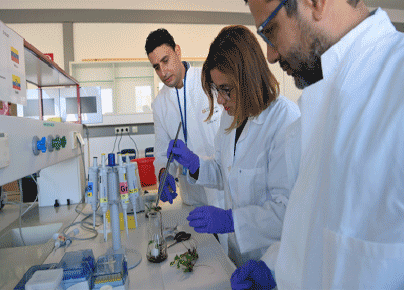IAEA - IAEA Trains Latin American Scientists in Fighting TR4
2022-03-18

The International Atomic Energy Agency (IAEA) has trained scientists from six Latin American countries to use nuclear and related techniques to detect and contain TR4. The training included the development of genetic disease resistance in bananas.
One of the most devastating banana diseases globally, the Fusarium TR4 wilt, spreads rapidly.
In response to an urgent request from affected countries, Director General Rafael Mariano Grossi pledged that the IAEA would provide immediate assistance in combating the disease and preventing it from causing further damage, working together with the Food and Agriculture Organization of the United Nations (FAO).
"Immediately after receiving the request for assistance, we dispatched a technical mission to assess the situation and provide emergency assistance. "Training scientists from the region is a vital part of this assistance. It builds skills and another capacity to manage and control the pest, " said Director General Grossi, who met the researchers during their training in the IAEA laboratories in Seibersdorf, Austria. He will also be meeting foreign and trade ministers from the Andean Community in Ecuador's capital Quito later this month.
As part of the assistance, twelve scientists from Brazil, Colombia, Costa Rica, Ecuador, Peru and Venezuela received training in February in Seibersdorf. The topics covered mutation breeding, tissue culture, development of mutant populations, and screening protocols for disease resistance.
"Thanks to the training, I understand the high potential of irradiation approaches to increase banana's resistance to Fusarium. I was glad to learn how the IAEA can contribute to the resolution of this important problem in our countries," said Mauricio Soto-Suárez, a PhD researcher in plant pathology from Colombia. He is one of the banana breeders, pathologists, and tissue culture specialists, who participated in the two-week training course at the Plant Breeding and Genetics Laboratory of the Joint FAO/IAEA Centre of Nuclear Techniques in Food and Agriculture in Seibersdorf and IAEA Headquarters in Vienna.
The IAEA will support the affected countries over the next five years in disease detection, surveillance, and containment. They will also receive scientific advice on boosting the genetic resistance of banana plants using mutation breeding and associated biotechnologies.
In August last year, experts and authorities from the Andean community - Bolivia, Colombia, Ecuador, and Peru - reached out to the IAEA when they discovered the continuing spread of the latest variant of the Fusarium wilt disease, Tropical Race 4 (TR4), in the region. It has now spread to more than 20 countries around the world.
The course follows an IAEA expert mission to the region in October last year when the existing situation for TR4 was discussed. A draft five-year plan was agreed upon, and urgent procurement needs were addressed.
The annual production of bananas across the globe amounts to some 155 million metric tons, with about 25 million tons exported from tropical countries in Latin America, the Caribbean and other parts of the world.
TR4 is a soil-borne disease, which can survive for decades in the soil, making it difficult to control. The only long-term response is developing and deploying new banana varieties with effective disease resistance. This can be done thanks to mutation breeding - a process using irradiation techniques that help establish new disease-resistant crop varieties for farmers. Confined to Southeast Asia for decades, TR4 was for the first time discovered in Latin America in 2019, causing a national emergency in Colombia, the fifth largest exporter of bananas in the world.
The IAEA has a long and established track record in applying nuclear and related techniques to improve crop plants and develop resistance to diseases in partnership with the FAO. Banana research in the IAEA/FAO laboratories and relevant capacity building in the Member States goes back at least two decades. It addresses critical techniques, including cell and tissue culture, mutation induction, disease and pest resistance screening, and related molecular and cytogenetics techniques.









